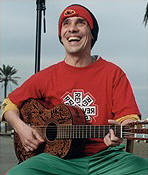This article was first
published on CLUAS in Aug 2003
Manu Chao
Imp of the Perversely Eclectic, a look at the career of Chairman Chao...
The campaigning Franco/Hispanic polyglot genius Manu Chao is continuing his
cheerful annexation of so-called world music with a 2003 world tour.
Superlatives and categories cannot contain the extreme eclecticism of this man's
work, which mostly takes the form of fantastically catchy rhythms drawn from the
finest musical traditions on the planet.
 Strangely,
he remains mostly unknown - or seen as some kind of novelty act - in many
western countries.
Strangely,
he remains mostly unknown - or seen as some kind of novelty act - in many
western countries.
Born in Paris to Spanish parents, Manu Chao (real name Oscar Tramor) has an
impeccable agit-pop pedigree to match his mish-mash of diverse international
influences. As the frontman of French punk internationalists Mano Negra, he
forged a political voice that still informs his solo enterprises, despite a
considerably more mellow sound; his albums now combine Caribbean reggae and
calypso, salsa, reggae, blues brass, old-skool punk, rap and hip-hop, Latin pop
and soul. They're also sprinkled with bright, melodic samples, from radio
jingles to ringing phones to tannoy addresses by Zapatista rebel leaders.
The lyrics are equally as global - the loveably-titled "Proxima Estacion:
Esparanza" (Next Station: Hope) features songs and passages delivered in
English, Spanish, French, Portuguese, Pidgin, Arabic, Russian and even Wolof (a
Senegalese dialect).
This babel is entirely appropriate, given his broad-based political worldview,
which sees him addressing human rights, oppression, racism, immigration, drugs,
dictatorship, under-education, marginalisation... but if you're imagining a
painfully right-on flamenco Sting (or something equally as awful), then hold on
- let's not forget the fun, the love, the infectious celebration of passion and
humanity that runs through his work.
'In Me Gustas Tu', the surprise hit which made him a superstar in many
countries, Chao enumerates a few of his favourite things: airplanes, travel,
tomorrow, the wind, the sea, the rain, marijuana, the mountains, the night, to
dream, to run.
Not exactly Julie Andrews' favourite things - she might have skipped the demon
weed, I suspect - but damned optimistic nonetheless.
Some have even alleged that Chao's unashamed joie de vivre condemns him
to the status of a trivialiser. The latest album from French anarcho-rockers Les
Wampas targets him directly with its wonderfully ridiculous title of "Never
Trust a Guy Who After Having Been a Punk Is Now Playing Electro".
But this is disingenuous and not a little unfair. Manu Chao's commitment is
palpable. He appears regularly at Anti-Globalisation protests and in fact helped
to found the Association for the Taxation of Financial Transactions for the Aid
of Citizens (ATTAC), which argues for a 0.1% levy on international capitalism to
finance public health schemes and fight inequality. He also engages in other
philanthropic activities and makes charitable contributions to various causes.
His dedication to grassroots, neighbourhood-level activism is expressed in his
busking and his tireless travels around the world, lugging a portable studio,
absorbing and collecting local politics, culture and sounds.
The live compilation, Radio Bemba Sound System - which is also the name of his
disparate band of zestful, talented musicians - showcases the multifarious
strands of his impressive career, from the punk philosophising of the Mano Negra
days to the dance-inflected funk and infectious ska of his solo work.
As a live outfit, Manu and the System are renowned for giving their all,
performing for hours in a riotous circus of enthusiasm and colour. The term
"world music" has become much debased over recent years, and was always a rather
trite label to begin with, but what Manu Chao can do is make the noises that the
world might make if it had a voice, the songs of joy it might roar out as it
shakes its big fat stupid ass, the pulse of billions of human souls spinning
through a pointless, colourful, loco universe.
Hugh Tynan
